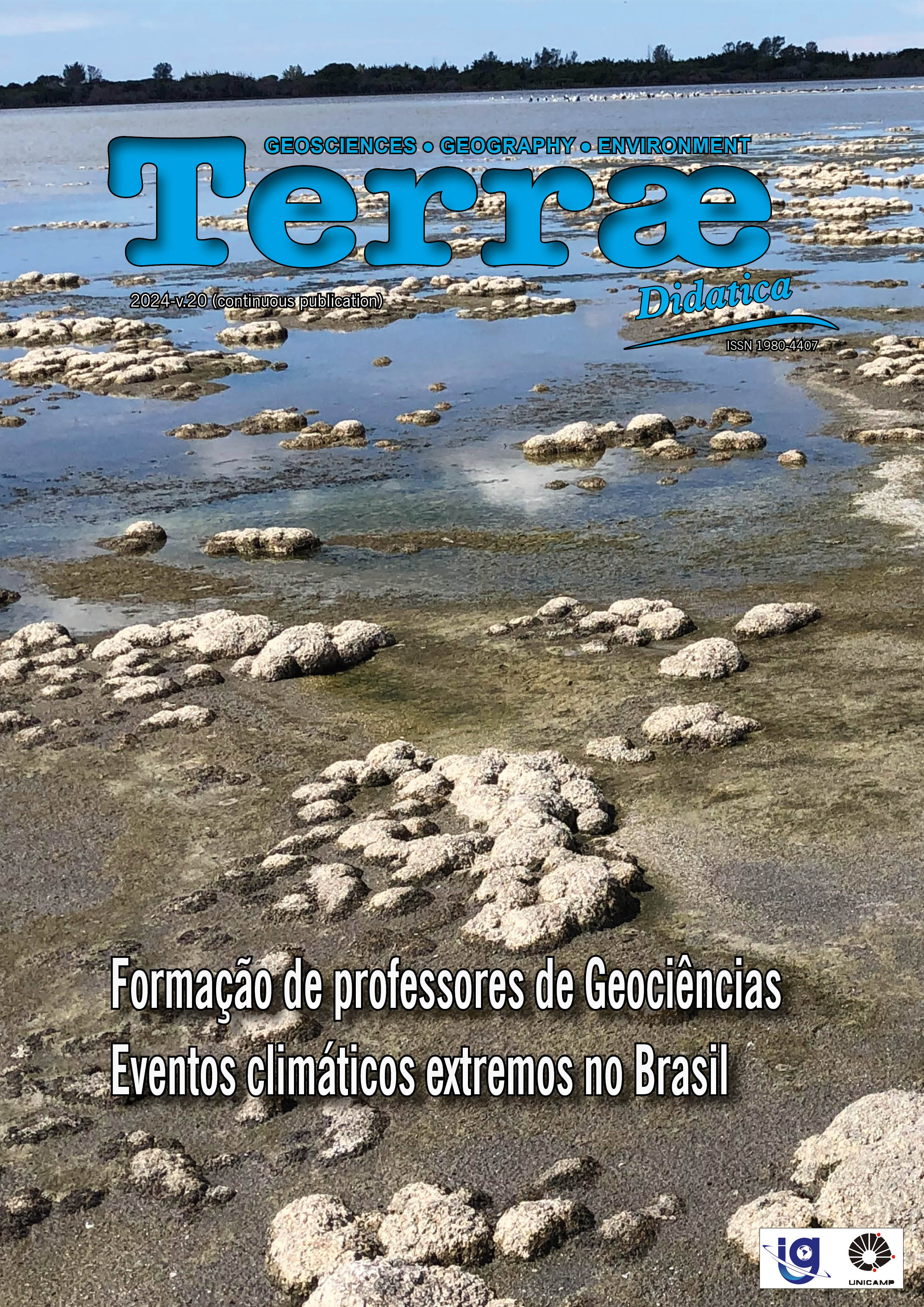Abstract
We are immersed in temporality. Saint Augustine [354-430] attributed to this inescapable fact the difficulty of explaining what time consists of, a concept of which we can only have an intuitive perspective: (...) we know nothing and cannot know about time (...) perhaps it would be appropriate to say that times are three: present of past things, present of present things, present of future things (Universo da Filosofia, 2018). The beautiful phrase in Renato Russo’s song, “we have our own time”, expresses a similar idea. - Symposium: Yes, we have our own time: in November 2023, the Graduate Program on Teaching and History of Earth Sciences (PTHES) recalled the planting of a small seed, 50 years ago, on Earth Sciences Education, at the University of São Paulo USP). The seed bore fruit, bringing together motivated people interested in expanding the dissemination of Geoscience knowledge, this time at Unicamp. Professors from USP, UNESP and other Higher Education Institutions (HEIs) also joined the movement. The Symposium on Geosciences and Teaching Interfaces: 50 years of experiences (1973-2023), whose proceedings can be downloaded from the URL: https://www.ige.unicamp.br/50anos-ensinogeo-2023/resumos/, revealed many facets of the busy trajectory of experiences, research and systematic activities dedicated to the dissemination of knowledge about the Earth, the environment and its social and economic transformations. Terræ Didatica is one of these develoments. Some of the papers pre-selected by the event's scientific committee of the symposium were accepted to compose volumes 19 and 20 of this journal. The symposium revealed the pioneering spirit, the innovations of the significant achievements made over five decades, while at the same time highlighting the advantages of collaborative work, capable of bringing together teachers from different disciplines and teaching units (Gonçalves et al., 2023). The pioneering spirit continues to this day, as PTHES is the only Postgraduate Teaching Program in Geosciences in Brazil. In other words, except better judgement, it is the unique national PPG on teaching dedicated to eminently strategic issues, such as the training of human resources for science and technology around the potential and limits of natural resources, which covers not only oil, hydrocarbons, iron, fertilizers and a multitude of mineral goods, but also water, the issue of climate change, the use of geothermal energy, the recognition and preservation of geo-biodiversity etc. The Symposium reinforced the idea that teachers need to have autonomy, freedom and resourcefulness to decide on the curriculum; prepare teaching materials; plan teaching units and activities and establish links between theory, field and laboratory practices. The Journal: Yes, we have our own time: with the publication of the volume 20, by the end of 2024, Terræ Didatica will celebrate twenty years of punctuality and regularity. During the break in 2005 (26/12/2005 to 01/01/2006), between Christmas and New Year, the Institute of Geosciences continued to work on finalizing the journal, so that by the end of 2005 it could be included in the global network (Terræ Didatica Editorial Team, 2005). In the course of that specific year, the contributions were added up, until the 96 pages of Volume 1 were produced. A few days later, the first printed copy would leave a printing house, to be distributed by post. The purpose of the IG-Unicamp journal was clear: to disseminate original articles, syntheses, reviews, educational proposals, teaching materials and resources on paper or in electronic form, news and information of interest to the Geology, Geography and Education communities, in Brazil and abroad.
References
Baker, V.R. (1996). The geological approach to understanding the environment. GSA Today, 6(3), 41-43. URL: https://rock.geosociety.org/net/gsatoday/archive/6/3/. Acesso 07.06.2023.
Cervato, C., & Frodeman, R. L. (2014). A importância do tempo geológico: desdobramentos culturais, educacionais e econômicos. Trad. M. C. Briani & P. W. Gonçalves from Cervato C., & Frodeman, R. L. (2012). Geol. Soc. Am. Spec. Paper, 486, p. 19-27. Terræ Didatica, 10(1), 67-79. doi: 10.20396/td.v10i1.8637389.
Equipe Editorial Terræ Didatica. (2005). Terræ Didatica chega para ampliar a interseção entre Ciências da Terra e Educação. Terræ Didatica, 1(1), 1-5. doi: 10.20396/td.v1i1.8637451.
Escobar, H. (2023). Desinformação disfarçada de ciência. Jornal da USP, 31(1). Publ. 25/08/2023, Atualizado: 13/11/2023, 13:18. URL: https://jornal.usp.br/atualidades/desinformacao-disfarcada-de-ciencia/. Acesso 11.12.2023.
Martins, J. R. S., & Carneiro, C. D. R. (2023). Como conceber os imensos intervalos do Tempo Geológico? Desvendando a história da Terra. In: Carneiro, C. D. R. (Org.) (2023). Explorando a Terra na Educação Básica. Campinas: Universidade Estadual de Campinas. p. 1-32. (Série Ciências da Terra na Educação Básica, v. 1, Progr. Pós-Grad. Ensino e História de Ciências da Terra). ISBN: 978-65-994829-0-8.
O’Connor, C. & Weatherall, J. O. (2019). The Misinformation Age: How False Beliefs Spread. Yale: Yale University Press. 280p. ISBN: 9780300234015
Rocha, L. C. (2021). As Tragédias de Mariana e Brumadinho. É Prejuízo? Para Quem? Caderno de Geografia, 31(1). doi: 10.5752/P.2318-2962.2021v31nesp1p184.
Universo da Filosofia (2018). Santo Agostinho e o Tempo. Universo da Filosofia. Publ. 02.10.2018. URL: https://universodafilosofia.com/2018/10/santo-agostinho-e-o-tempo/. Acesso 07.12.2023.

This work is licensed under a Creative Commons Attribution 4.0 International License.
Copyright (c) 2023 Celso Dal Ré Carneiro, Pedro Wagner Gonçalves, Sueli Yoshinaga Pereira, Fresia Soledad Ricardi Torres Branco, Priscila Pereira Coltri


